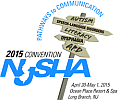Selective Attention in Musically Trained Bilingual Children
Thursday, 4:00pm to 6:00pm
Seabright
Poster 2
This research was guided by two questions: 1. Does exposure to early musical training enhance bilingual child's ability to switch attention from attribute based rules to new attribute based rules? 2. Do musically trained bilingual children demonstrate ability to discriminate emotions in speech prosody of unfamiliar language better than their non-musically trained counterparts? Data was collected from nineteen Russian-English bilingual children consisting of ten girls and 9 boys with or without musical training. Two tasks were administered to each participant's Dimensional Change Card Sort Task (DCCST), and listening to the recording of the phrase 'It's nice to be outside when it's raining' spoken by scho-age children in Russian, English and Persian in three emotional inflections sad, neutral, and happy. Results indicate that musical training significantly improves bilingual children's ability to switch attention from task to task and their ability to discriminate extreme emotions in an unfamiliar language.
Track:
Pediatric
